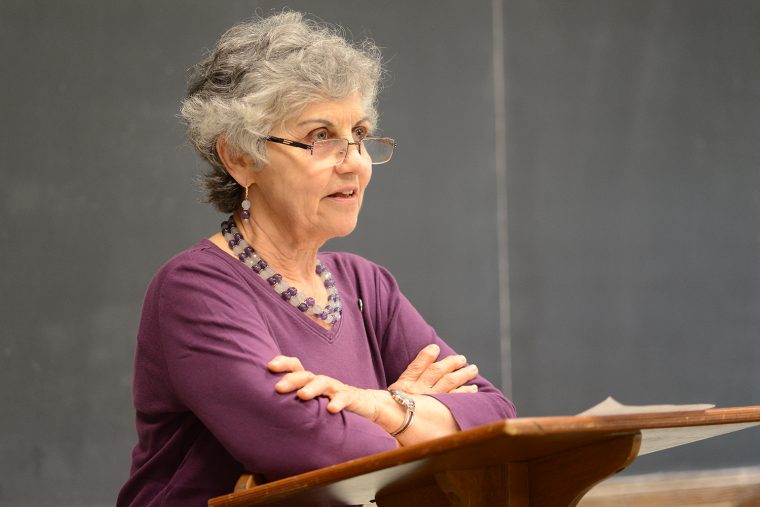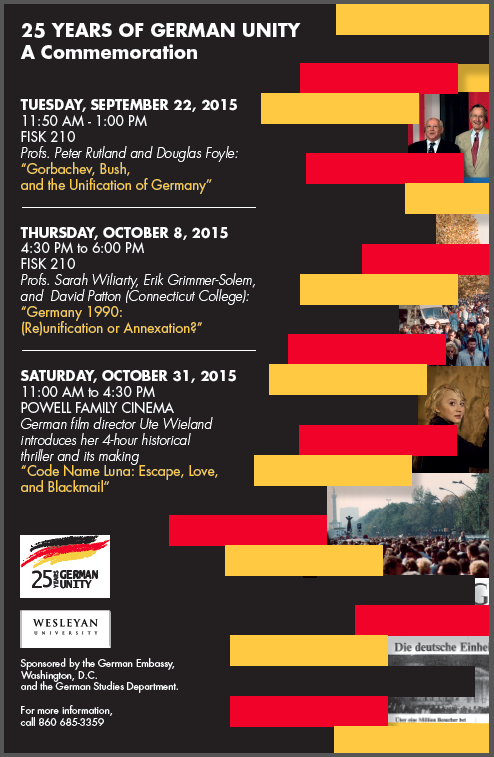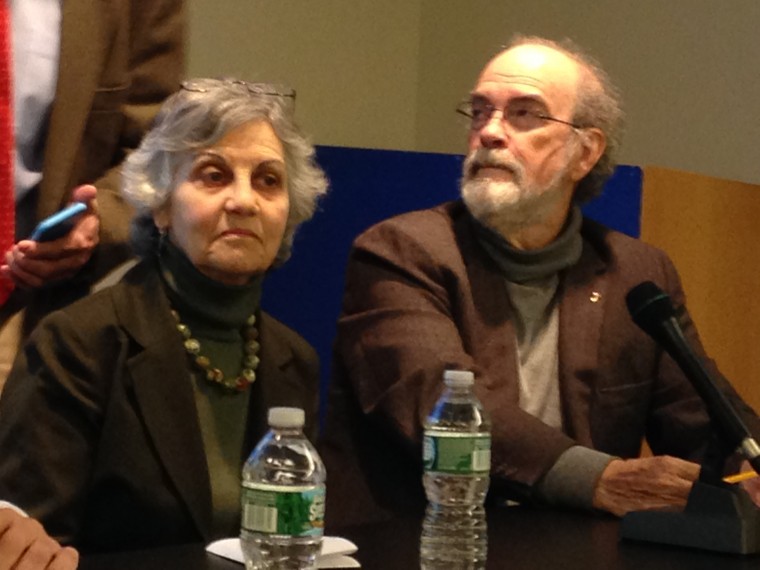In July, three faculty will begin new appointments at Wesleyan. Katja Kolcio will succeed Peter Rutland as director of the Allbritton Center for the Study of Public Life; Stephanie Weiner will succeed Sean McCann as director of the Shapiro Center for Writing; and Krishna Winston will succeed David Beveridge and Alex Dupuy as director of the Wasch Center for Retired Faculty. Katja Kolcio, associate professor of dance, received certificates from Free Ukrainian University and from Kyiv Institute of Art and Culture; and her PhD from The Ohio State University. Her work specializes in the role of creative physical engagement in…
Krishna Winston, Marcus L. Taft Professor of German Language and Literature, Emerita, recently translated four film narratives by German screenwriter and author Werner Herzog. The collection, titled Scenarios III, was published by the University of Minnesota Press in 2019. It presents the shape-shifting scripts for Herzog’s early films: Stroszek; Nosferatu, Phantom of the Night; Where the Green Ants Dream; and Cobra Verde. Scenarios III completes the picture of Herzog’s earliest work, affording a view of the filmmaker mastering his craft, well on his way to becoming one of the most original, and most celebrated, artists in his field. Winston also translated Herzog's Signs…
The American Association of Teachers of German (AATG) recently named Krishna Winston, Marcus L. Taft Professor of German Language and Literature, Emerita, an honorary fellow of the association. The fellowship is limited to 25 fellows worldwide. Founded in 1926, the AATG has nearly 3,500 members and "believes that bringing the language, literature, and cultures of the German speaking-world to all Americans is a vital humanistic endeavor, which serves an essential national interest," according to its website. To receive this honor, Winston was nominated by 10 colleagues, with the nomination approved by the Honorary Fellows Committee and voted on by the…
For the second time, an author whose work Krishna Winston, the Marcus L. Taft Professor of German Language and Literature, Emerita, translated, has won the Nobel Prize in Literature. The 2019 Nobel Prize in Literature was awarded to Austrian author Peter Handke on October 10 "for an influential work that with linguistic ingenuity has explored the periphery and the specificity of human experience," according to the Nobel committee. Handke has become "one of the most influential writers in Europe after the Second World War," the committee said. Winston, who specializes in literary translation, began translating Handke after his long-time English…
Lizzie Whitney ’19, a College of Letters and German studies double major from California, is the recipient of a 2019 DAAD scholarship for study/research in Germany. The Deutscher Akademischer Austauschdienst, or German Academic Exchange Service (DAAD) supports the internationalization of German universities and promotes German studies and the German language abroad. The study scholarship is presented to graduating seniors at the top of their class. Whitney, who is applying to the University of Konstanz for graduate school, will use her DAAD scholarship to support her studies in comparative literature. The study scholarship also provides students with a monthly stipend plus funds for…
Iris Bork-Goldfield, chair and adjunct professor of German studies, has been elected to serve as the Northeast Region representative to the Executive Council of the American Association of Teachers of German. The American Association of Teachers of German (AATG) supports the teaching of the German language and German-speaking cultures in elementary, secondary, and post-secondary education in the United States. The AATG promotes the study of the German-speaking world in all its linguistic, cultural and ethnic diversity, and endeavors to prepare students as transnational, transcultural learners and active, multilingual participants in a globalized world. (more…)
Associate Professor of History Erik Grimmer-Solem presented a talk, "The Wehrmacht Past, the Bundeswehr, and the Politics of Remembrance in Contemporary Germany," at the meeting of the Connecticut Academy of Arts and Sciences (CAAS), April 12. Grimmer-Solem also is associate professor of German studies and a tutor in the College of Social Sciences. His expertise is in modern German history with specializations in economic history, the history of economic thought, and the history of social reform. He has also developed research interests in German imperialism, German-Japanese relations before 1918, and Germany in the two world wars. Grimmer-Solem discussed his research, which uncovered…
Leo Lensing, professor of film studies, is the author of a review essay titled “Fritz Lang, man of the eye. On the Edgar Allan Poe of German Cinema,” published in the June 15 issue of the Times Literary Supplement (London). The TLS cover article takes stock of Fritz Lang. Die Biographie (Propyläen Verlag, 2014), the first full-length biography in German of the great Austrian-German filmmaker Fritz Lang (1890-1976), and compares it unfavorably with Fritz Lang. The Nature of the Beast, the standard American life by Patrick McGilligan. Lang’s reputation, Lensing writes, continues to be linked primarily to two films he…
This fall, the German Studies Department and German Embassy in Washington, D.C. are sponsoring a three-part commemoration of "25 Years of German Unity" at Wesleyan. The series, which features discussions with a German filmmaker, a scholar from Connecticut College, and four Wesleyan faculty is made possible by a $3,000 grant from the German Embassy. The first talk, “Gorbachev, Bush, and the Unification of Germany” on Sept. 22 featured Peter Rutland, the Colin and Nancy Campbell Professor in Global Issues and Democratic Thought, professor of government, and Douglas Foyle, associate professor of government, who spoke on the important role that Russia, Mikhail Gorbachev,…
On April 28, Krishna Winston, the Marcus L. Taft Professor of German Language and Literature, spoke on a panel at the CUNY Graduate Center on Nobel Prize–winner Günter Grass, one of Germany's best-known contemporary writers, who died earlier this month. Winston, Grass's translator, is also professor of German Studies, professor of environmental studies, and coordinator of the Mellon Mays Undergraduate Fellowship. She spoke alongside Professor Friedrich Ulfers of New York University and Breon Mitchell, professor emeritus at Indiana University, Bloomington. The event, which was standing-room only, was moderated by Ralph Bunche Institute Director John Torpey, a professor at the CUNY Graduate…
When the Nobel Prize-winning German writer Günter Grass died at age 87 this week, The Wall Street Journal turned to Krishna Winston, his translator, for perspective on his life. According to the Journal's obituary, Grass was Germany's best-known contemporary writer "who explored the country's postwar guilt and in 2006 admitted to serving in one of the Nazis' most notorious Nazi military units." Winston remembered Grass as "a gregarious man who loved cooking and invited his children to sit in on meetings with translators that often lasted several days..." (more…)
A commentary by Leo Lensing, chair and professor of German studies, professor of film studies, was featured in the Times Literary Supplement in January. The commentary focuses on Austria’s exploitation of Karl Kraus’s great anti-war drama, The Last Days of Mankind, to commemorate the 100th anniversary of the beginning of the First World War. Kraus first published the play in four special issues of his satirical journal Die Fackel (The Torch) in 1918–19. "The red wrappers and the documentary photograph of Wilhelm II used as the frontispiece of the epilogue initially lent it the explosive impact of a revolutionary pamphlet," Lensing writes in the commentary. "Kraus…







